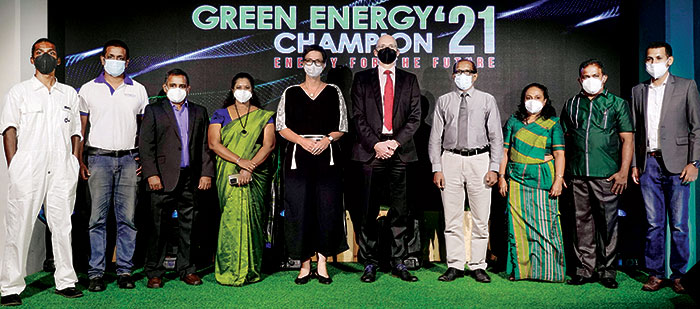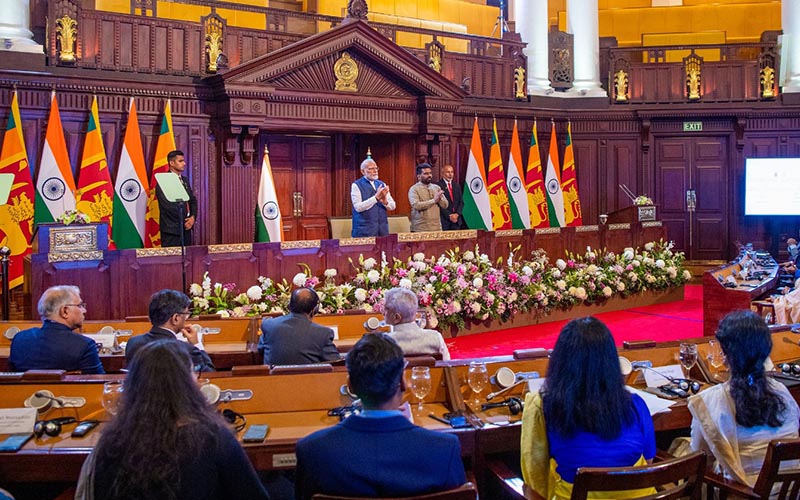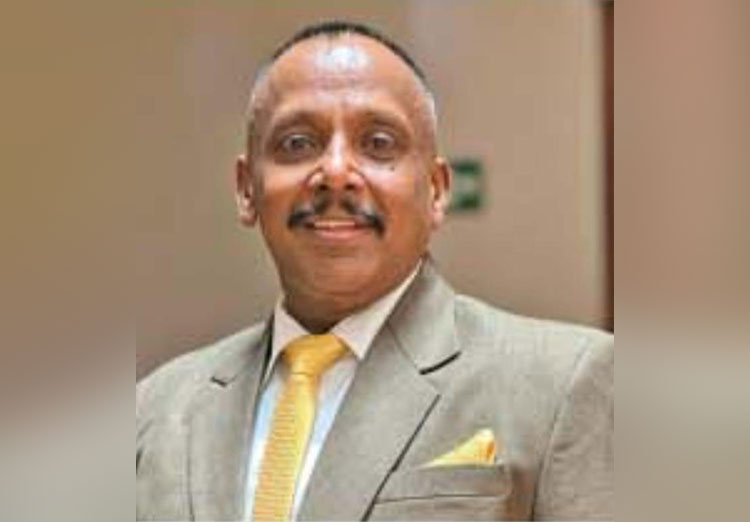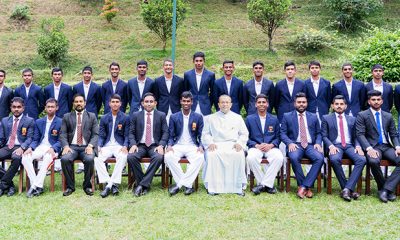Business
Green Energy Innovation at Demo Day 2022

The fourth edition of the Green Energy Champion (GEC) competition has moved into its final phase with the launch of the ‘Demo Day’ where the winning five green energy innovators – namely Ecosteem, Sanota, Rhoda, Route Sonar and Eco Tech Base – presented their solutions to an audience comprising local and international industry leaders, investors, business executives, and several other dignitaries.
The Green Energy Champion competition is set to identify the most promising ideas and innovations from the thriving Sri Lankan start-ups and small and medium enterprises. The winning innovations ranged from smart mobility solutions like route optimization and the first Sri-Lankan e-bike, affordable solar powered rooftiles and hot water systems to a household-based organic fertilizer and biogas solution.
GEC’s Demo Day was livestreamed on 3rd February 2022. After the welcome by Country Director of GIZ Sri Lanka, Christiane Einfeldt, the Ambassador of the Federal Republic of Germany to Sri Lanka and the Maldives, Holger Seubert, and the Chairman of the Sri Lanka Sustainable Energy Authority, Ranjith Sepala, addressed the gathering as guests of honour.
In his keynote address, Sepala, highlighted the ambitious goals Sri Lanka has set: “Sri Lanka has begun an important journey towards completing carbon neutrality by 2050. In this journey, we have set a goal to realize 70% of electricity generated by renewable energy sources by 2030. We are delighted that the Federal Foreign Office of Germany joined hands with us by commissioning the Green Energy Champions initiative which is certainly a timely landmark project for Sri Lanka. I congratulate the five green energy startup innovators and their renewable energy ideas and solutions towards a greener Sri Lanka.”
Ambassador Seubert in his address pointed out that the new German government has put climate change action at the forefront of their agenda. Congratulating the five winners, he added: “Green Energy Champion shows us every year that there is huge, untapped potential for creative ideas in the renewable energy sector here in Sri Lanka. Entrepreneurs and private sector are vital in the shift towards a greener economy. It is the innovations driven by companies which – enabled by the right policy frameworks – can scale sustainable solutions within very short timeframes.”
The founders of Ecosteem, Sanota, Rhoda, Route Sonar and Eco Tech Base pitched their business solutions to the investor and partner network gathered at the event, concluding Demo Day with a networking session aimed at facilitating alliances and partnerships among key green energy stakeholders.
During 2021, the five local green energy innovators had participated in a six-month accelerator programme with Hatch and Good Life X (GLX), which helped them fine-tune their business model, develop their products and build strong local and international business relationships in the Green Energy ecosystem.
After intensive capacity building and mentoring by renowned industry experts, the five teams are equipped with the knowledge and skills to develop their businesses further while simultaneously creating a positive impact on the environment, the community, as well as the economy.
The ‘Green Energy Champion’ is a programme that supports innovators who are driven to lead the Green Energy revolution. The project is commissioned by the German Federal Foreign Office and implemented by Deutsche Gesellschaft für Internationale Zusammenarbeit (GIZ) GmbH together with the State Ministry of Solar, Wind and Hydro Power Generation Projects Development, the Sri Lanka Sustainable Energy Authority and the Delegation of German Industry and Commerce in Sri Lanka.
For more information, please visit www.greenenergychampion.lk & follow us on facebook.com/greenenergychampion and instagram.com/greenenergychampion
Business
President and Indian PM jointly launch and inaugurate three development projects

The inauguration and commencement of three development projects implemented in the country with the assistance of the Indian Government took place on Saturday (05)
These projects include the commencement of construction of the Sampur Solar Power Plant, which will add 50 megawatts to the national grid, the inauguration of the Temperature and Humidity Controlled Agro Cold Storage complex in Dambulla and the installation of solar panels on 5,000 religious sites. President Anura Kumara Disanayake and Prime Minister Shri Narendra Modi jointly inaugurated and launched these projects via virtual technology following their official meeting at the Presidential Secretariat on Saturday morning.
Prime Minister Modi’s visit to Sri Lanka reaffirms the concept of “Friendship of Centuries, Commitment to a Prosperous Future,” strengthening the deep-rooted ties between the two nations.
The Sampur Solar Power Plant is part of the Eastern Renewable Energy Zone, which is being established under Sri Lanka’s Long-Term Generation Expansion Plan (LTGEP). It is being developed by Trincomalee Power Company, a joint venture between India’s NTPC Limited and the Ceylon Electricity Board (CEB).
The project is planned in two phases, with the second phase scheduled to commence in 2027. A 500-acre land area has been allocated for this initiative, under the first phase it will contribute 50 megawatts of electricity to the national grid. The project will incorporate state-of-the-art N-type TOPCon solar cell technology, enhancing energy security and promoting a shift from fossil fuel dependency to renewable energy sources. Consequently, the Sampur Solar Power Project is expected to reduce annual carbon dioxide emissions by approximately 200,000 tonnes.
The Dambulla Agricultural Storage Complex (Cold Storage Facility), with a capacity of 5,000 metric tons and equipped with temperature and humidity control, was inaugurated today with the objective of reducing post-harvest losses by approximately 40%, stabilizing fluctuations in agricultural product prices, ensuring the supply of high-quality food to consumers and enhancing agricultural sustainability.
To facilitate research on advanced storage methods for different crops, the facility includes six storage chambers, each designed to simulate various climatic conditions. This is the first facility of its kind in Sri Lanka, built at a total cost of LKR 524 million, with LKR 300 million provided as a grant by the Government of India and LKR 224 million contributed by the Government of Sri Lanka.
The Government of India has invested USD 17 million on the project to install solar panels on 5,000 religious sites and places of worship representing all major religions in all 25 districts. The nitiative, is being implemented jointly by the Ceylon Electricity Board, the Sri Lanka Sustainable Energy Authority and Lanka Electricity Company (Pvt) Ltd.
Under this project, 5,000 solar panel systems with a capacity of 5 kW each will be installed on the rooftops of Buddhist, Hindu, Muslim, Catholic and Christian places of worship. This is expected to add 25 megawatts of solar power capacity to the national electricity grid. The initiative underscores the government’s commitment to a cost-effective, sustainable and reliable energy system.
[PMD]
Business
Will the U.S. 44% Tariff on Sri Lankan Exports Harm Key Industries? Examining the Impact and Sri Lanka’s Path Forward – Ambassador Kananathan

Sri Lanka’s export sector is grappling with a significant challenge following the United States’ decision to impose a 44% reciprocal tariff on Sri Lankan goods. This steep tariff threatens the country’s trade with the U.S., particularly in the apparel industry, which serves as a cornerstone of Sri Lanka’s economy.
Tea and Other Exports Also Under Threat
The repercussions extend beyond apparel, with tea exports at risk due to increased costs that may reduce Sri Lanka’s competitiveness against major producers like India, Kenya, and China. Other key export segments, including spices, seafood, and coconut-based products, are also likely to face price pressures, making it difficult for Sri Lankan exporters to sustain their foothold in the U.S. market.
Given that the United States is a major buyer of Sri Lankan goods, this move raises concerns about trade competitiveness, long-term sustainability, and economic stability. The question now is: how will this tariff impact Sri Lanka’s export-driven industries, particularly apparel, and what strategies can be employed to counteract the effects?
A Major Blow to the Apparel Sector – Sri Lanka’s Leading Foreign Exchange Earner
Ambassador Kana Kananathan, former High Commissioner to Kenya, has warned that this development could severely impact the apparel sector, which accounts for nearly 40% of Sri Lanka’s total exports. With U.S. buyers contributing approximately $3.3 billion annually, the apparel trade constitutes a crucial revenue stream for the nation.
A 44% tariff would substantially raise the cost of Sri Lankan apparel, making it less competitive compared to manufacturers in Bangladesh, Vietnam, Cambodia, and India. This could lead to a significant drop in orders from American buyers, posing a serious threat to the industry’s growth and employment rates.
Navigating the Challenge: Government and Industry Response
While immediate government intervention is necessary to mitigate these effects, businesses must also take proactive measures. Innovation, market diversification, and strengthening supply chain resilience will be essential strategies for overcoming these trade barriers. With the right approach, Sri Lanka can navigate this challenge and position itself more robustly in the global marketplace.
Ambassador Kananathan also suggested that exporters explore the ‘1/3 Cost-Sharing Model’ as a potential solution. Under this approach:
=Sri Lankan Manufacturers accept a partial reduction in profit margins, ensuring their products remain competitively priced.
=U.S. Retailers and Brands agree to absorb a portion of the tariff, recognizing the value of maintaining a reliable Sri Lankan supply chain.
=Raw Material Suppliers provide pricing flexibility, such as offering discounts or extending credit terms, to help offset cost increases.
By adopting these strategic adjustments, Sri Lanka’s export industry can mitigate the immediate impact of the tariff while laying the foundation for long-term trade resilience.
( Ambassador Kananathan was Sri Lanka”s former High Commissioner to Kenya and with concurrent accreditation to 23 African countries as well as Sri Lanka’s Permanent representative to UNEP and UN Habitat)
Business
Three Sinha Industries wins award for excellence at SLIA

Three Sinha Industries Pvt. Ltd. has been recognised with the Award of Excellence at the Sri Lanka Institute of Architects (SLIA) Annual Product Awards, held recently in Colombo. The award was presented for the company’s high-quality, fire-resistant doors, which are made using locally sourced materials and designed to meet the highest safety standards. The award ceremony was held recently in Colombo, and Managing Director Manjula Ariyakumara accepted the award on behalf of the company, marking yet another milestone in Three Sinha’s journey of excellence.
From its establishment as a small-scale business, Three Sinha has grown into a trusted name in Sri Lanka’s construction industry. The company has built a strong reputation for its commitment to quality, innovation, and reliability, earning both local and international recognition. Over the years, it has received several certifications for maintaining top-tier quality standards. Three Sinha has also received many other local and international awards.
Three Sinha Industries offers a diverse range of products and services, including roller doors, shutters, and fire-resistant doors that provide enhanced safety and durability. The company also specialises in aluminum fabrications, sensor doors, and automatic barriers, ensuring a comprehensive suite of solutions for the construction sector. Embracing sustainability, Three Sinha has expanded into green energy solutions, offering three types of solar PV electricity systems: on-grid, off-grid, and hybrid. Additionally, its subsidiary, IKLO Industries, focuses on pre-fabricated and pre-engineered steel buildings, incorporating advanced technology to meet modern construction demands. IKLO has also ventured into the agricultural sector by introducing tractor trailers tailored for farming needs. Moreover, the company manufactures high-quality diesel tanks that meet the standards of both the Ceylon Petroleum Corporation and the Indian Oil Corporation.
-

 Business2 days ago
Business2 days agoDaraz Sri Lanka ushers in the New Year with 4.4 Avurudu Wasi Pro Max – Sri Lanka’s biggest online Avurudu sale
-

 News7 days ago
News7 days agoBid to include genocide allegation against Sri Lanka in Canada’s school curriculum thwarted
-

 Business3 days ago
Business3 days agoStrengthening SDG integration into provincial planning and development process
-

 Business2 days ago
Business2 days agoNew SL Sovereign Bonds win foreign investor confidence
-

 Sports4 days ago
Sports4 days agoTo play or not to play is Richmond’s decision
-

 Features13 hours ago
Features13 hours agoStarlink in the Global South
-

 Latest News6 days ago
Latest News6 days agoIPL 2025: Rookies Ashwani and Rickelton lead Mumbai Indians to first win
-

 Sports5 days ago
Sports5 days agoTrinity, St. Anthony’s out to end decade long victory drought











